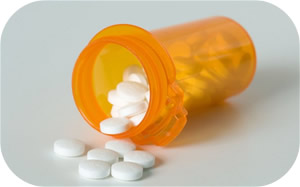Alternative Treatment Options
 There are other treatment options for gout that do not include natural techniques. These techniques are usually a last resort for sufferers of chronic gout who fail to find helpful treatment in the natural treatment options. These treatments also come with a variety of risk factors, which is why they are often only considered when all other treatment options fail. NSAIDs (pills like ibuprofen, Motrin, naproxen) may be administered for gout sufferers. These options typically focus on masking the symptoms and have no real world solution for preventing gout or stopping it. The risks involved with these types of medications include dependence, and long-term (and even short-term) use can create drastic, destructive changes to your body and its organs. Every year, 16,500 NSAID related deaths occur in patients who suffer from arthritis type symptoms (5). Another treatment option is a corticosteroid injection to the affected joint area. This method is for chronic, long-term cases of gout and is typically given to those who are not able to swallow NSAIDs. Side effects from corticosteroid injections include infection at the injection site, increased blood sugar and blood pressure, and even rapid mood swings. Colchicine is a type of painkiller that is prescribed for patients with gout. It is regarded as being quite effective, however the side-effects include: nausea, vomiting, and diarrhea. There are also medications that block uric acid production such as Aloprim or Zyloprim. These limit the amount of uric acid we make naturally in our bodies to help reduce cases of gout. Common side-effects include rash, nausea, low blood count, and reduced liver function. Medications that are designed to help remove uric acid faster and more effectively have been known to reduce the risk of gout. Side effects for these types of medications include stomach pain and even kidney stones because they alter the normal way that our digestive system works and the way we process waste from our bodies.
There are other treatment options for gout that do not include natural techniques. These techniques are usually a last resort for sufferers of chronic gout who fail to find helpful treatment in the natural treatment options. These treatments also come with a variety of risk factors, which is why they are often only considered when all other treatment options fail. NSAIDs (pills like ibuprofen, Motrin, naproxen) may be administered for gout sufferers. These options typically focus on masking the symptoms and have no real world solution for preventing gout or stopping it. The risks involved with these types of medications include dependence, and long-term (and even short-term) use can create drastic, destructive changes to your body and its organs. Every year, 16,500 NSAID related deaths occur in patients who suffer from arthritis type symptoms (5). Another treatment option is a corticosteroid injection to the affected joint area. This method is for chronic, long-term cases of gout and is typically given to those who are not able to swallow NSAIDs. Side effects from corticosteroid injections include infection at the injection site, increased blood sugar and blood pressure, and even rapid mood swings. Colchicine is a type of painkiller that is prescribed for patients with gout. It is regarded as being quite effective, however the side-effects include: nausea, vomiting, and diarrhea. There are also medications that block uric acid production such as Aloprim or Zyloprim. These limit the amount of uric acid we make naturally in our bodies to help reduce cases of gout. Common side-effects include rash, nausea, low blood count, and reduced liver function. Medications that are designed to help remove uric acid faster and more effectively have been known to reduce the risk of gout. Side effects for these types of medications include stomach pain and even kidney stones because they alter the normal way that our digestive system works and the way we process waste from our bodies.
REFERENCES
Vitart V, Rudan I, Hayward C et al. (April 2008). SLC2A9 is a newly identified urate transporter influencing serum urate concentration, urate excretion and gout.Nat. Genet. 40 (4): 437–42
Choi HK, Atkinson K, Karlson EW, Willett W, Curhan G Purine-rich foods, dairy and protein intake, and the risk of gout in men. N Engl J Med. 2004 Mar 11;350 (11):1093-103.
CJ Eastmond et al. The effects of alcoholic beverages on urate metabolism in gout sufferers. British Journal of Rheumatology 1995 34: 756-759).
Roddy, Edward. Gout. BMJ 347. October 2013
Wolfe M. MD, Lichtenstein D. MD, and Singh Gurkirpal, MD, Gastrointestinal Toxicity of Nonsteroidal Anti-inflammatory Drugs, The New England Journal of Medicine, June 17, 1999, Vol. 340, No. 24, pp. 1888-1889.

